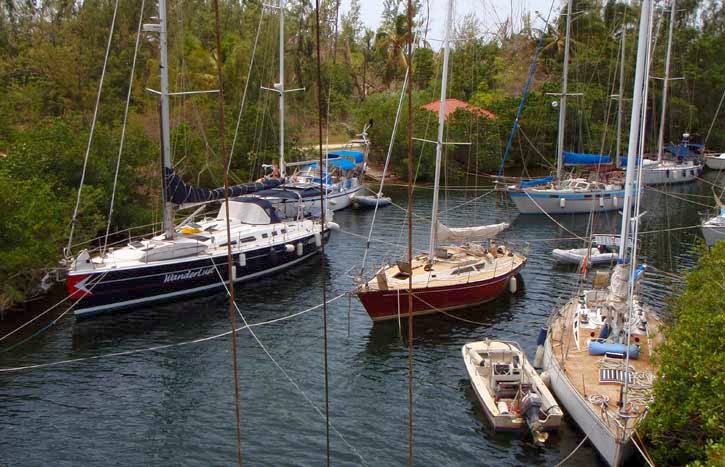If you are going south and your severe weather plan is to head to the closest hurricane hole be prepared for higher insurance premiums. A lot of people I speak to are surprised to discover this fact.
A hurricane hole is a relatively safe place to run from a tropical cyclone – unless it is crowded with other boats. In a crowded location there is a very high risk that another boat will drag anchor or break free. When that occurs it wreaks havoc on the other boats, fouls other anchor lines and can take other boats with it onto the shore or coral reefs.
The other consideration is how civilization has changed hurricane holes over the last 50 years. Mangroves have been bulldozed to build condominiums and the natural shoreline has changed in many locations. This can significantly reduce the safety of a hurricane hole.
Just about every client who suffered a total loss or significant damage due to a hurricane was in a hurricane hole when the damage occurred. I read about one hurricane hole in Puerto Rico that was hit by the eye-wall of a category 4 hurricane. In that storm over 60% of the 200 boats were severely damaged or sunk. If you are hit with a Cat 4 or 5 storm a hurricane hole may provide very little protection. Boats on shore are not immune to damage but it is usually much less severe.

The best choice is to simply get out of the way of an approaching hurricane. Never attempt to move your boat unless you can make a safe harbour well ahead of the storm’s forecasted arrival (24 hours minimum).
If moving is not an option the next best precaution is to haul the boat on shore in an area safe from storm surge. Secure the boat by removing canvas, sails and other loose gear. Hurricane tie-downs are also recommended. If your boat has a drain plug make sure it is in.
Only if moving or hauling out are not possible should you consider heading to the closest hurricane hole. Get there as early as possible and set your anchor with plenty of scope (7 to 1 minimum) and good chafing protection. The most important consideration is that you never risk your life or that of your crew to protect the boat.
When you tell your insurance company that your severe weather plan is to find the closest hurricane hole then you are going to be considered a higher risk. If you can get insurance it is going to be expensive.
Everyone planning to head south should have a severe weather plan. A good starting point for developing your hurricane plan is the Discover Boating Guide to Hurricane Preparation
